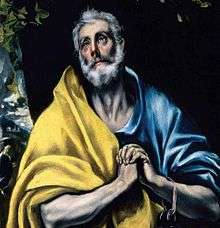Peter in Islam
| Part of a series on |
| Saint Peter |
|---|
 |
| In the New Testament |
| Other |
Peter (Butrus), known also as Simon Peter or Simon Cephas, was, according to Muslim tradition and exegesis, one of the original disciples of Jesus.[1] Although Jesus's disciples, as that of the other prophets, have not played a major role in Islamic theology, the disciples of Jesus are notable in that they are the only group of disciples specifically identified in the Quran.[2] Peter's figure, especially in Shia theology, is important as he is generally regarded as the first Imâm (Leader) after Jesus,[3] and therefore is in accordance with the Christian (specifically the Roman Catholic) view of Peter as the 'Prince of the Apostles'.
The Qur'an is clear on the fact that the disciples of Jesus were steadfast believers in Allah. The Qur'an records that when Jesus began to feel the rejection of the Israelites, he asked the people as to who among them will be his supporters in preaching the Gospel. It was then that the disciples stood up and asked Jesus to bear witness that they had submitted to God and further promised to stay by Jesus during his whole life.[4] The Qur'an further records that God inspired the disciples to believe in His message and messenger. It further recounts a feast from Heaven, which was a sign for the disciples of Jesus[5] Although the Quran does not name or number the disciples, Qur'anic exegesis names the disciples, and Peter is usually listed at the forefront of all lists, corresponding with his role as the head of the disciples.[6]
Numerous incidents involving Peter are narrated in Muslim tradition and tafsir. The most famous of these is the narrative of Peter's preaching in Antioch, which is closely linked with the legend of Habib the Carpenter. Muslim tradition narrates that two of Jesus's disciples went to preach the Gospel in Antioch, the disciples being John and Jude, as the people of Antioch were devoted to idols. Few people, however, followed John and Jude's message, despite the fact that the two disciples performed various miracles including healing the sick and the blind.[7] The disciples healed Habib's son and Habib helped preach the Gospel to the people. When the news of the disciples reached the governor of the city, he called to see John and Jude. As the governor did not agree with the message of God, he threw John and Jude into prison. While they were in prison Peter went to Antioch. Peter was allowed to perform a miracle in front of the governor, when he raised a child who had been dead for seven days. The people however refused to believe Peter's words and got angry at Habib for his faith and stoned him to death.[7] Non-Muslim sources maintains that Peter later went to Rome to preach the Gospel.[8]
Peter is important in branches of Shi`i theology as well as Ismailism, as his role is seen as the direct parallel to that of `Ali as the first Imâm after a Prophet. Shi`i Muslims maintain that every major Prophet had a Disciple or Waṣî (وصي) (Executor-of-Will) who became the Imam (Leader) after his death: Adam had Seth; Noah had Shem; Abraham had his sons; Moses had Joshua; and Jesus had Peter.[9]
Believed descendants
For information about Narjis, her mother, and her reported son (the twelfth Imam of Twelver Shi'i Muslims), see the articles Narjis and Twelfth Imam.
See also
References
- ↑ Historical Dictionary of Prophets In Islam And Judaism, Brandon M. Wheeler, Disciples of Christ: "Muslim exegesis identifies the disciples as Peter, Andrew, Matthew, Thomas, Philip, John, James, Bartholomew, and Simon"
- ↑ Quran 3:49–53
- ↑ No god but God, Reza Aslan, Random House Trade Paperbacks, 2006
- ↑ Quran 3:52: "When Jesus found Unbelief on their part He said: "Who will be My helpers to (the work of) Allah?" Said the disciples: "We are Allah's helpers: We believe in Allah, and do thou bear witness that we are Muslims."
- ↑ Quran 5:111–115
- ↑ Almost all classical and modern scholars accept much of the New Testament list as being sound and B.M. Wheeler states: "Muslim exegesis identifies the disciples as Peter, Andrew, Matthew, Thomas, Philip, John, James, Bartholomew, and Simon"
- 1 2 Hughes Dictionary of Islam, T. P. Hughes, Habib An-Najjar, pg. 153
- ↑ A-Z of Prophets in Islam and Judaism, B. M. Wheeler, Disciples of Jesus
- ↑ Concise Encyclopedia of Islam, C. Glasse, Ismailis: "According to Ismailism, Prophets come in cycles which comprise a 'great week' of seven thousand years. Each cycle is presided over by one of the prophets whom the Quran calls 'Possessors of Steadfastness' as its outward prophet (Adam, Noah, Abraham, Moses, Jesus and Muhammad), as well as by an 'intermediary' (Seth, Shem, Ishmael, Aaron, Peter, Ali)..."